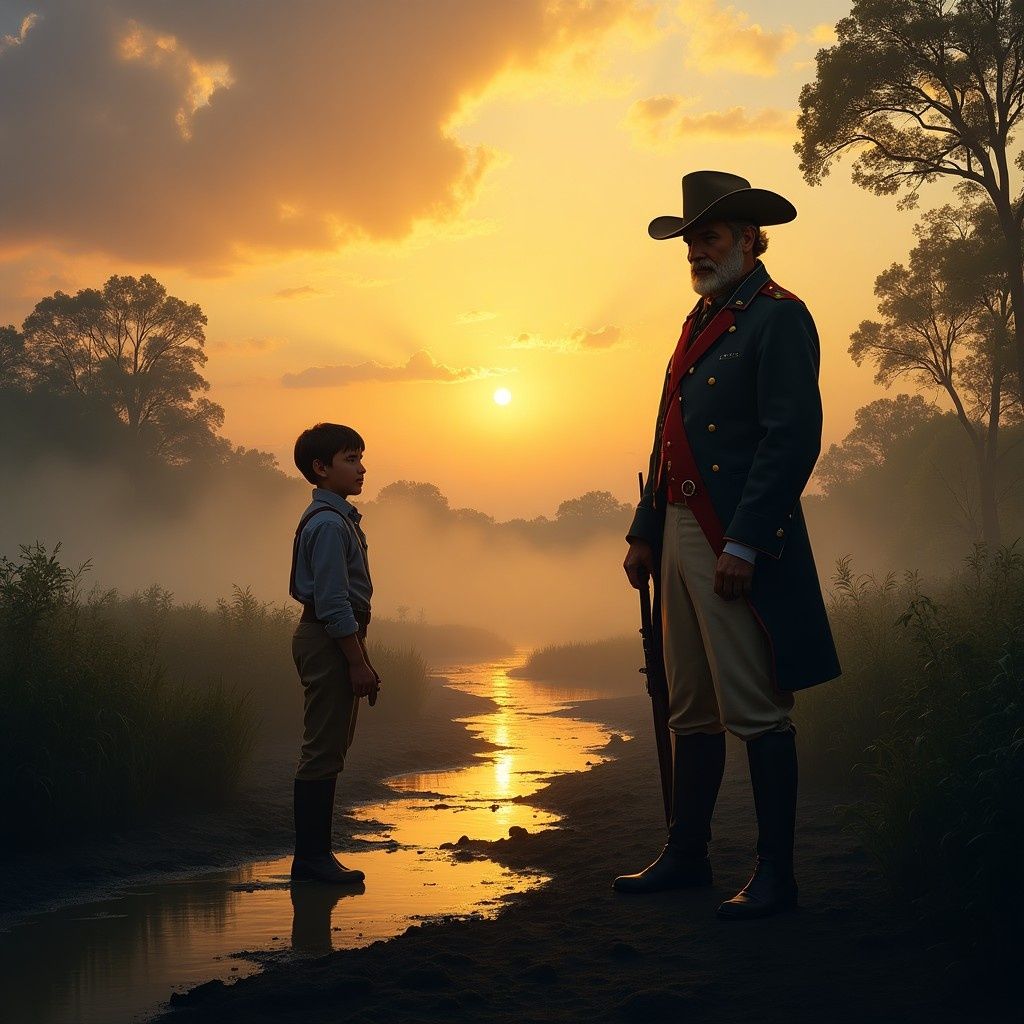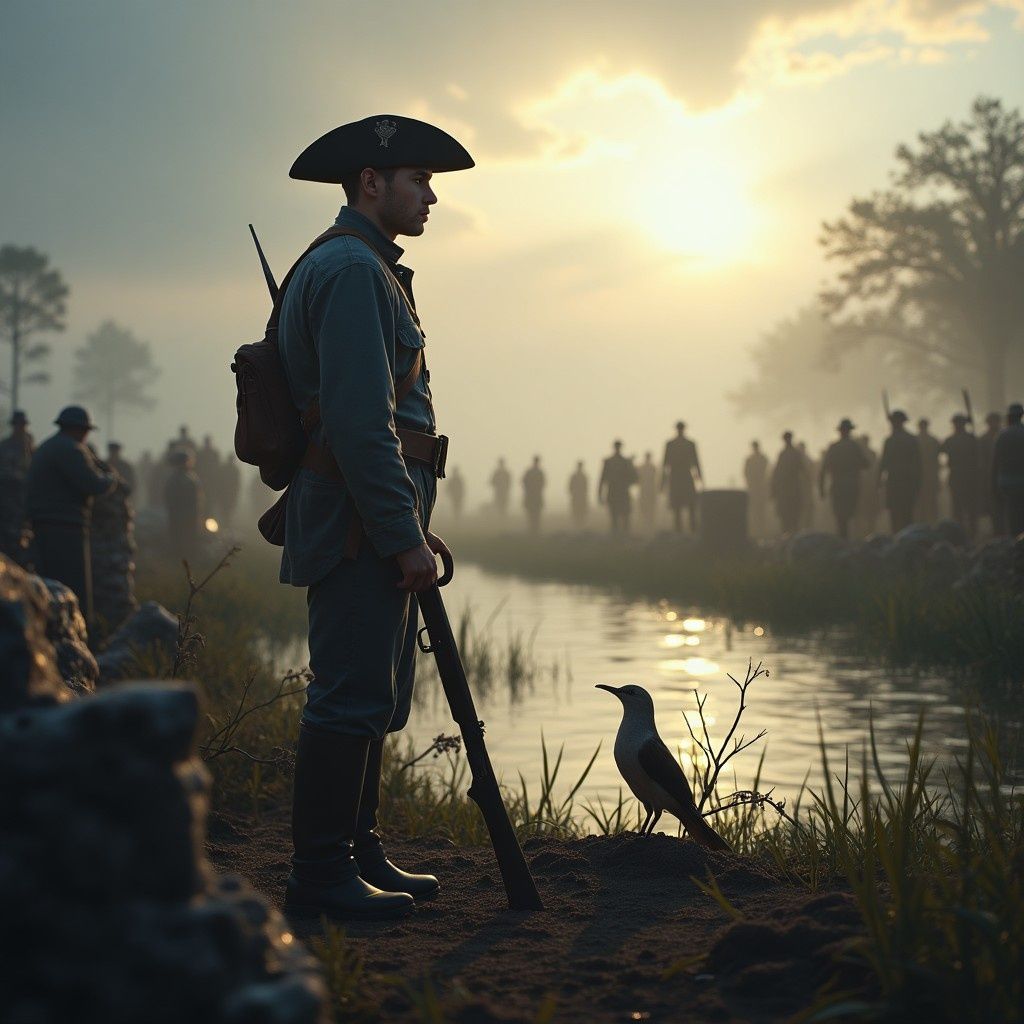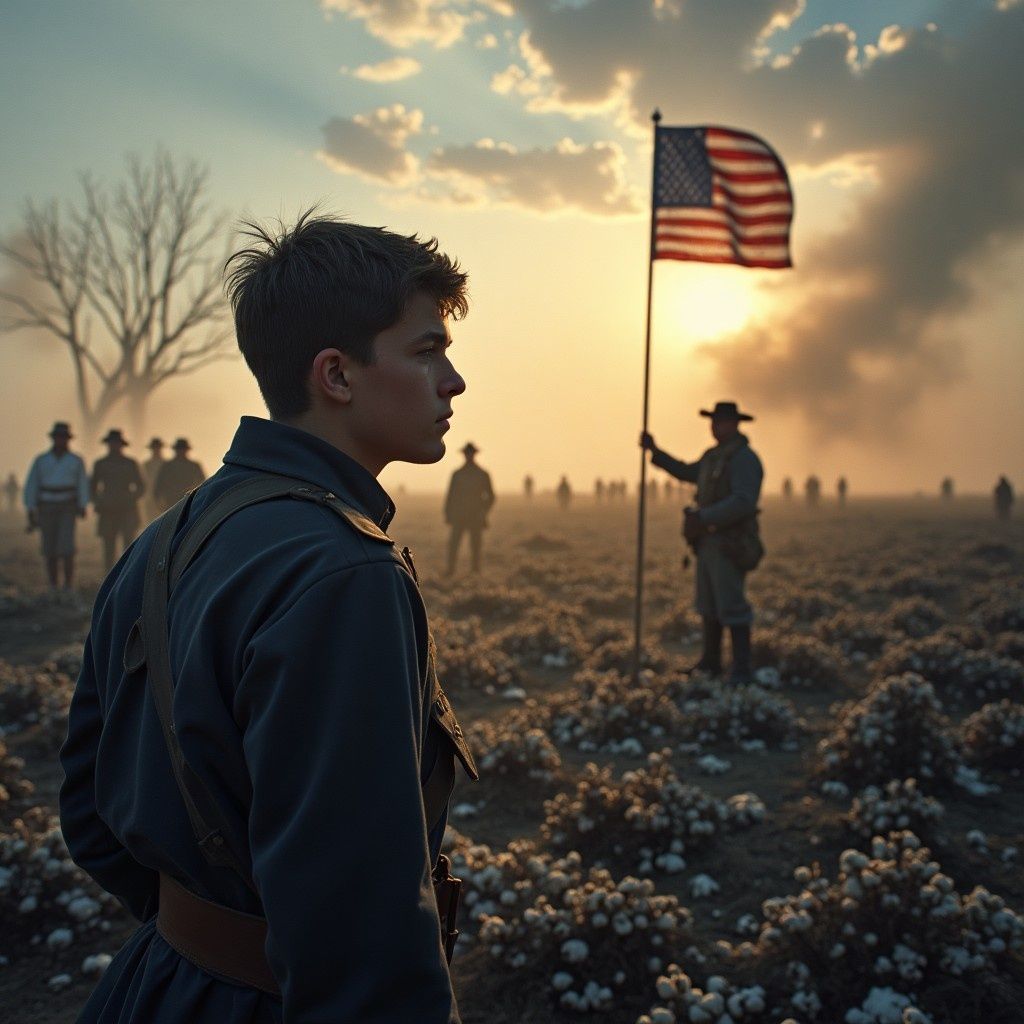The air was thick with tension as dawn broke over the misty swamps of Louisiana. The Mississippi River glistened under the first light, a silent witness to the impending clash. Major General Andrew Jackson stood resolute, his eyes scanning the horizon. His heart pounded with a mix of fear and determination. He knew the stakes were high. The city of New Orleans lay vulnerable behind him, its fate resting on the shoulders of the ragtag army he had assembled.

Among Jackson's men was a young soldier named Caleb McAllister. Barely twenty, Caleb had left his family's small farm in Tennessee to join the fight. He was drawn by the promise of adventure and the chance to prove himself. Now, standing amidst the makeshift barricades of cotton bales and mud, he wondered if he would ever see his home again. "Keep your head down, Caleb," whispered Eli, a seasoned veteran beside him. Eli had become a mentor to Caleb, his gruff exterior hiding a heart of gold. "The British ain't here for tea and crumpets." Caleb nodded, gripping his musket tighter. He could hear the distant rumble of the British forces advancing, their red coats like a bloodstain against the morning sky. Major General Sir Edward Pakenham led them, his reputation as a formidable commander preceding him. The British aimed to seize New Orleans, a prize that would alter the course of history. As the first shots rang out, chaos erupted. Smoke and gunfire filled the air, mingling with the cries of men and the thunder of cannons. Caleb fought with a ferocity he didn't know he possessed, driven by the thought of his family and the land he loved. Around him, his comrades fell, their sacrifice a poignant reminder of the cost of freedom.

Jackson moved among his troops, his presence a beacon of hope. His strategic brilliance was evident in the defensive line he had crafted, utilizing the natural landscape to his advantage. He was a man of contradictions—tough yet compassionate, driven by an unyielding sense of duty. The battle raged on, each side refusing to yield. Caleb found himself face to face with a British soldier, their eyes locking in a moment of shared humanity before instinct took over. As the soldier fell, Caleb felt a pang of sorrow, a reminder of the senselessness of war. By midday, the tide had turned. The British, despite their superior numbers, faltered against the unyielding American defense. Pakenham fell, his plans unraveling with his demise. The British retreated, leaving behind a field littered with the fallen. As the smoke cleared, Caleb stood amidst the wreckage, his body weary but his spirit unbroken. The victory was bittersweet, a testament to the resilience of the human spirit. Around him, men embraced, their cheers echoing across the battlefield. They had defended their land, their freedom, and their future.

For Jackson, the victory was a defining moment. It cemented his status as a national hero, a leader who had defied the odds. Yet, as he looked over the battlefield, he knew the cost of glory. The faces of the fallen haunted him, a reminder of the price of ambition. Caleb returned home a changed man, his youthful innocence tempered by the harsh realities of war. He carried with him the stories of those who had fought beside him, their courage a beacon of hope in a world torn by conflict. The Battle of New Orleans, though fought after the war's official end, became a symbol of American resilience and determination. It was a victory that transcended the battlefield, shaping the future of a nation and the lives of those who had fought for its survival.

Among Jackson's men was a young soldier named Caleb McAllister. Barely twenty, Caleb had left his family's small farm in Tennessee to join the fight. He was drawn by the promise of adventure and the chance to prove himself. Now, standing amidst the makeshift barricades of cotton bales and mud, he wondered if he would ever see his home again. "Keep your head down, Caleb," whispered Eli, a seasoned veteran beside him. Eli had become a mentor to Caleb, his gruff exterior hiding a heart of gold. "The British ain't here for tea and crumpets." Caleb nodded, gripping his musket tighter. He could hear the distant rumble of the British forces advancing, their red coats like a bloodstain against the morning sky. Major General Sir Edward Pakenham led them, his reputation as a formidable commander preceding him. The British aimed to seize New Orleans, a prize that would alter the course of history. As the first shots rang out, chaos erupted. Smoke and gunfire filled the air, mingling with the cries of men and the thunder of cannons. Caleb fought with a ferocity he didn't know he possessed, driven by the thought of his family and the land he loved. Around him, his comrades fell, their sacrifice a poignant reminder of the cost of freedom.

Jackson moved among his troops, his presence a beacon of hope. His strategic brilliance was evident in the defensive line he had crafted, utilizing the natural landscape to his advantage. He was a man of contradictions—tough yet compassionate, driven by an unyielding sense of duty. The battle raged on, each side refusing to yield. Caleb found himself face to face with a British soldier, their eyes locking in a moment of shared humanity before instinct took over. As the soldier fell, Caleb felt a pang of sorrow, a reminder of the senselessness of war. By midday, the tide had turned. The British, despite their superior numbers, faltered against the unyielding American defense. Pakenham fell, his plans unraveling with his demise. The British retreated, leaving behind a field littered with the fallen. As the smoke cleared, Caleb stood amidst the wreckage, his body weary but his spirit unbroken. The victory was bittersweet, a testament to the resilience of the human spirit. Around him, men embraced, their cheers echoing across the battlefield. They had defended their land, their freedom, and their future.

For Jackson, the victory was a defining moment. It cemented his status as a national hero, a leader who had defied the odds. Yet, as he looked over the battlefield, he knew the cost of glory. The faces of the fallen haunted him, a reminder of the price of ambition. Caleb returned home a changed man, his youthful innocence tempered by the harsh realities of war. He carried with him the stories of those who had fought beside him, their courage a beacon of hope in a world torn by conflict. The Battle of New Orleans, though fought after the war's official end, became a symbol of American resilience and determination. It was a victory that transcended the battlefield, shaping the future of a nation and the lives of those who had fought for its survival.
The Battle of New Orleans, fought on January 8, 1815, was a significant clash between British forces led by Major General Sir Edward Pakenham and American troops under Brevet Major General Andrew Jackson. Despite occurring after the Treaty of Ghent had been signed to end the War of 1812, the battle was crucial as news of the treaty had not yet reached the combatants. The British aimed to capture New Orleans and possibly reclaim territories from the Louisiana Purchase, but were decisively defeated by Jackson's well-fortified and strategically positioned forces. This American victory, despite being after the war's official end, bolstered national pride and established Andrew Jackson as a national hero, significantly impacting his future political career and contributing to the decline of the Federalist Party.


Comments
Post a Comment